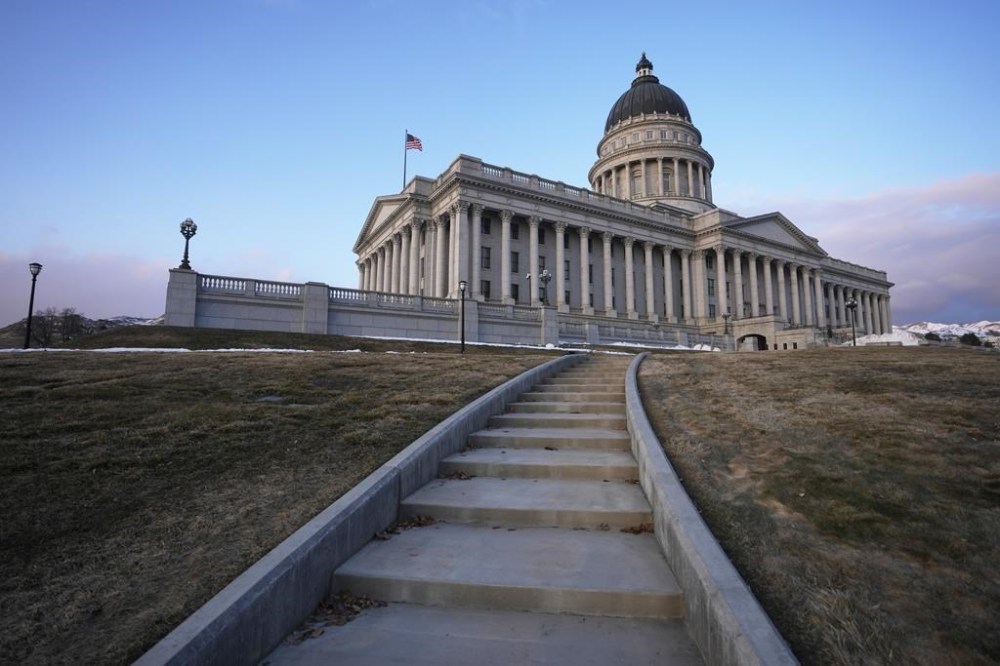Utah law requiring age verification for porn sites remains in effect after judge tosses lawsuit
Advertisement
Read this article for free:
or
Already have an account? Log in here »
To continue reading, please subscribe:
Monthly Digital Subscription
$0 for the first 4 weeks*
- Enjoy unlimited reading on winnipegfreepress.com
- Read the E-Edition, our digital replica newspaper
- Access News Break, our award-winning app
- Play interactive puzzles
*No charge for 4 weeks then price increases to the regular rate of $19.00 plus GST every four weeks. Offer available to new and qualified returning subscribers only. Cancel any time.
Monthly Digital Subscription
$4.75/week*
- Enjoy unlimited reading on winnipegfreepress.com
- Read the E-Edition, our digital replica newspaper
- Access News Break, our award-winning app
- Play interactive puzzles
*Billed as $19 plus GST every four weeks. Cancel any time.
To continue reading, please subscribe:
Add Free Press access to your Brandon Sun subscription for only an additional
$1 for the first 4 weeks*
*Your next subscription payment will increase by $1.00 and you will be charged $16.99 plus GST for four weeks. After four weeks, your payment will increase to $23.99 plus GST every four weeks.
Read unlimited articles for free today:
or
Already have an account? Log in here »
Hey there, time traveller!
This article was published 01/08/2023 (865 days ago), so information in it may no longer be current.
SALT LAKE CITY (AP) — A Utah law requiring adult websites to verify the age of their users will remain in effect after a federal judge dismissed a lawsuit from an industry group challenging its constitutionality.
The dismissal poses a setback for digital privacy advocates and the Free Speech Coalition, which sued on behalf of adult entertainers, erotica authors, sex educators and casual porn viewers over the Utah law — and another in Louisiana — designed to limit access to materials considered vulgar or explicit.
U.S. District Court Judge Ted Stewart did not address the group’s arguments that the law unfairly discriminates against certain kinds of speech, violates the First Amendment rights of porn providers and intrudes on the privacy of individuals who want to view sexually explicit materials.

Dismissing their lawsuit on Tuesday, he instead said they couldn’t sue Utah officials because of how the law calls for age verification to be enforced. The law doesn’t direct the state to pursue or prosecute adult websites and instead gives Utah residents the power to sue them and collect damages if they don’t take precautions to verify their users’ ages.
“They cannot just receive a pre-enforcement injunction,” Stewart wrote in his dismissal, citing a 2021 U.S. Supreme Court decision upholding a Texas law allowing private citizens to sue abortion providers.
The law is the latest anti-pornography effort from Utah’s Republican-supermajority Legislature, which since 2016 has passed laws meant to combat the public and mental health effects they say watching porn can have on children.
In passing new age verification requirements, Utah lawmakers argued that because pornography had become ubiquitous and easily accessible online, it posed a threat to children in their developmentally formative years, when they begin learning about sex.
The law does not specify how adult websites should verify users’ ages. Some, including Pornhub, have blocked their pages in Utah, while others have experimented with third-party age verification services, including companies such as Yoti, which uses webcams to scan faces and estimate ages based on their features.
Opponents have argued that age verification laws for adult websites not only infringe upon free speech, but also threaten digital privacy because it’s impossible to ensure that websites don’t retain user identification data. On Tuesday, the Free Speech Coalition, which is also challenging a similar law in Louisiana, vowed to appeal the dismissal.
“States are attempting to do an end run around the First Amendment by outsourcing censorship to citizens,” said Alison Boden, the group’s executive director. “It’s a new mechanism, but a deeply flawed one. Government attempts to chill speech, no matter the method, are prohibited by the Constitution and decades of legal precedent.”
State Sen. Todd Weiler, the age verification law’s Republican sponsor, said he was unsurprised the lawsuit was dismissed. He said Utah — either its executive branch or Legislature — would likely expand its digital identification programs in the future to make it easier for websites to comply with age verification requirements for both adult websites and social media platforms.
The state passed a first-in-the-nation law in March to similarly require age verification for anyone who wants to use social media in Utah.
Utah Attorney General Sean Reyes, one of the officials named in the lawsuit, applauded Stewart’s dismissal and called age verification requirements “reasonable safeguards for our children.”
“The innocence and safety of our children are paramount and worth protecting ardently,” he said in a statement.
__
This story was first published on Aug. 1, 2023. It was updated on Aug. 2, 2023, to clarify that an age estimation program offered by the company Yoti uses facial scanning to estimate a person’s age, not facial recognition that cross-checks faces with databases to authenticate an individual’s identity.


